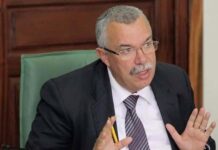It seems clear that the statement issued by the Ennahda movement on Wednesday, in which it admitted to bearing responsibility for the state of affairs during its reign, deepens the movement’s political and moral crisis. Also, self-criticism does not mean writing a short statement to admit the mistake or freeze the membership of a prominent leader like Imed Hammami, who for years implemented the decisions of the movement’s leader, Rached Ghannouchi, and adhered to his instructions.
The statement was manipulative in a way, as it justified the acknowledgment of responsibility for the deteriorating conditions in the country by saying that the movement did not fail alone. It states that failure is borne by other parties according to their size in participating in ruling and managing the country, which automatically means that the movement does not want to admit its responsibility for the political, economic, health and security crises that the country has reached although it was the main party in all governments, either directly or behind the scenes.
The statement said that Ennahda “understands the anger of the street and is ready for a serious and objective evaluation and deep revisions during its next conference in order to achieve renewal in the vision and programs and open horizons for young people to develop the movement.”
Observers say that the recognition of the failure that came in the statement, despite its vague language, shows that President Kais Saied was right when he took the measures of the twenty-fifth of July, which were based on freezing Parliament and dissolving the government, both of which were controlled by Ennahda. They added that this recognition renders the movement’s stances that targeted President Saied invalid and irresponsible.
Observers note that the “deceitful” statement aims to absorb the growing state of popular and political anger against the movement, relieve it of responsibility for the difficult situation in the country, and demand the opening of judicial files to identify those responsible for corruption and assassinations.
The statement also contains an indirect message to President Kais Saied stating that the movement does not want to compete with him or confront him, and that it is experiencing internal differences that will not be resolved before holding its conference which raises such questions as:
When will this conference be held and under what conditions?
Will Ghannouchi impose renewal on himself, taking advantage of the confusion experienced by the movement?
The statement shows that Ennahda, which has stopped any activity in the recent period, is in a state of political confusion; neither did it succeed in its decision to confront Kais Saied, nor did it succeed in calming down.
The president’s recent statements regarding the assassinations also put pressure on the Ennahda movement, especially when he said, “As for those who speak during the night and the ends of the day and lie and say that their reference is Islam, where are they from Islam and from the purposes of Islam?”
What embarrasses Ennahda is that the presidential accusations strike to the core the image it wants to present itself as a political movement that believes in democracy and the peaceful transfer of power.
The movement is also in a state of anxiety due to regional changes that may lead its supporters (especially Turkey and Qatar) to radically change their attitudes towards it after the various reconciliation meetings, and it may live in a situation similar to the situation experienced by the Brotherhood in Egypt, which Turkey began to abandon.
Although the insidious recognition externally aims to calm down and relieve pressure on the movement, Ghannouchi seeks within the movement to hold others responsible for what happened despite the high voices of the leaders and public of Ennahda calling for him to announce his resignation and to allow a new leadership to reform the path that made it a prime target of popular anger.
Ghannouchi had dismissed all 32 members of the movement’s executive office, and decided to restructure the office in a way that “responds to the requirements of the stage.” Later, he began a campaign to dismiss the leaders who announced their opposition to his confrontational statements towards Kais Saied, and the first victim was Imed Hammami, who was the closest to Ghannouchi and assigned to him several positions in the Ennahda movement, and during successive governments he held some ministerial portfolios.
Ghannouchi suspended Imed Hammami’s membership due to “repeating his transgressions of the movement’s policies,” meaning that it was a reaction to what Hammami said a few days ago in support of President Saied and criticizing the performance of the Ennahda movement’s leader.
Hammami said, “What President (Saied) did was a positive shock, and it cannot be described as a coup, and the Ennahda movement – headed by Rached Ghannouchi – is responsible for this.”
Political analyst Nabil Rabhi considered that “Ghannouchi’s freezing of Hammami means that he has become a sole ruler within the movement, and that he wants to prove that he is still the actual and real ruler in the party.”











